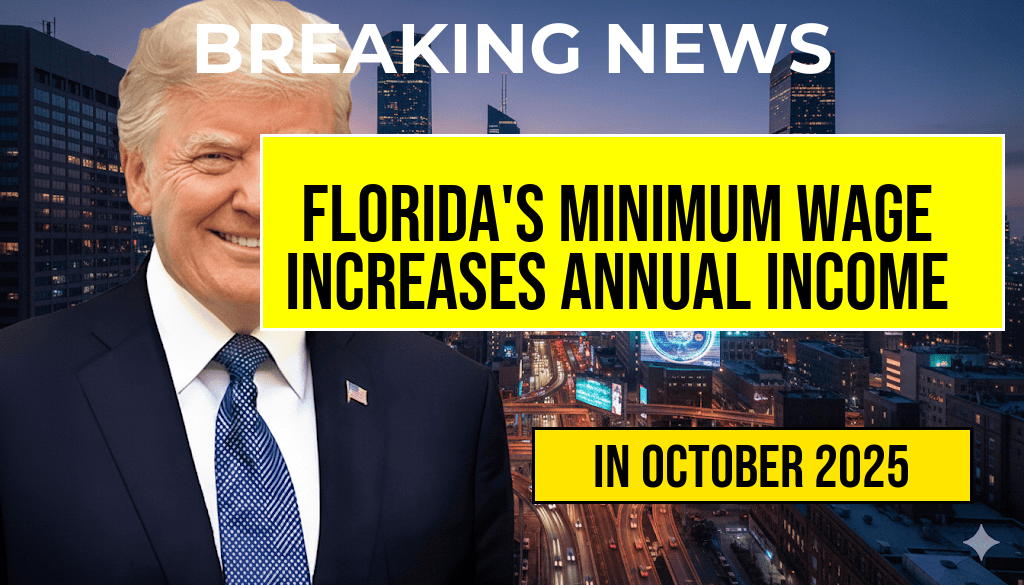Florida’s recent decision to raise the minimum wage to $14 per hour has sparked conversations about economic impacts and cost of living adjustments for full-time workers across the state. Effective immediately, this increase is set to enhance the annual income of full-time employees by approximately $2,080, translating to a significant boost in take-home pay for many families and individuals striving to make ends meet in an increasingly expensive environment. With this adjustment, Florida continues its commitment to elevating the living standards of its workforce, aligning with broader national trends aimed at addressing wage stagnation and rising inflation.
Details of the Minimum Wage Increase
The increase from $13 to $14 per hour is part of a phased approach aimed at reaching a $15 minimum wage by 2026. This latest adjustment is expected to affect hundreds of thousands of workers statewide, particularly in sectors heavily reliant on hourly wages such as retail, hospitality, and service industries.
Economic Implications
The immediate benefit of the wage increase is clear: full-time employees working 40 hours per week will see their annual earnings rise from $27,040 to $29,120. This change offers a much-needed financial cushion for those facing the pressures of rising living costs. As noted by economic analysts, the adjustment could have ripple effects throughout the local economy.
- Increased Consumer Spending: With more disposable income, workers are likely to spend more, stimulating local businesses.
- Job Market Effects: Employers may need to adjust their pay scales for other positions to remain competitive, potentially leading to a broader wage increase across sectors.
- Potential for Inflation: While increased wages can boost spending, there are concerns about inflationary pressures, as businesses may pass on increased labor costs to consumers.
Support and Opposition
The wage increase has garnered support from various labor groups and advocacy organizations, who argue that it is a crucial step toward ensuring a living wage for all workers. Proponents highlight that many families struggle to meet basic expenses, and this wage boost is essential for improving their quality of life.
However, some opposition arises from business owners and certain economic commentators who caution that such increases could lead to job losses or reduced hiring as companies grapple with higher payroll expenses. Critics argue that small businesses, in particular, may struggle to absorb the increased costs without raising prices or cutting hours.
Comparative State Analysis
Florida’s new minimum wage aligns with a growing trend among U.S. states to improve worker compensation. Notably, other states such as California and New York have already implemented similar wage increases, reflecting an evolving landscape in labor laws nationwide.
| State | Current Minimum Wage | Planned Increase |
|---|---|---|
| Florida | $14.00 | $15.00 by 2026 |
| California | $15.50 | $15.50 (ongoing) |
| New York | $15.00 | $15.00 (ongoing) |
Looking Ahead
The future of Florida’s minimum wage will depend on several factors, including economic conditions and political dynamics. As the state approaches the $15 minimum wage mark, stakeholders will be watching closely to assess the impact on employment, business viability, and overall economic health.
For more information about the implications of minimum wage increases, visit Forbes or review the comprehensive overview on Wikipedia.
Frequently Asked Questions
What is the new minimum wage in Florida?
Florida’s new minimum wage has been increased to $14 per hour.
How much will full-time workers earn annually with the new minimum wage?
With the $14/hour minimum wage, full-time workers will see their annual income rise by $2,080.
When will the new minimum wage take effect?
The new minimum wage is effective as part of the state’s plan to gradually reach $15 per hour by 2026.
Who will benefit from the increase in minimum wage?
The increase in the minimum wage will primarily benefit full-time workers earning less than the new rate, providing them with a higher annual income.
What impact does the minimum wage increase have on the economy?
The boost in the minimum wage may lead to increased consumer spending, as workers have more disposable income, potentially stimulating the Florida economy.

Leave a Reply